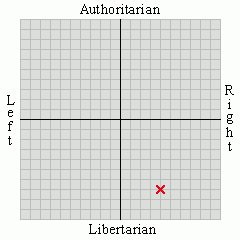Starting in reverse order, the biggest single thing that Britain should resist doing at all costs is adopting Australian style compulsory voting. Yes, we all know there's a problem with voter apathy and an obvious answer to that is simply to make voting compulsory, but is marching everyone down the polling stations really a good solution? I admit I used to be in the 'it's a civic duty' school of thought and was all for the idea, though I was cured of that even before I moved to Australia and saw it used in practice. The reality is that compulsory voting comes with its own baggage, not least of which is the point that it's not much of a free vote and you are much less than a free citizen if you are not free to withhold your vote. For that reason alone I'm opposed to the idea, which is a bit of a bugger now I live somewhere that does it, but there are a couple of big practical problems with it as well. First is the one Sean Gabb of the Libertarian Alliance mentions on this video.
As he says there is more than just idleness going on here. Millions of voters are going on strike, and with the increasing similarity of the main parties (in that they're all equally unpalatable, though occasionally for different reasons) I've joined them. I'm sure there are a certain amount of non-votes that are down to simple laziness and/or a complete lack of interest but I'm just as sure that there are plenty like me who feel disenfranchised, not through having had their vote taken away but just because there just isn't an option on the ballot paper for them. Some will protest vote or will settle for voting against the candidate or party they dislike most rather than for the one they think is best, as Sean Gabb said he'd do so, but I've never been a fan of that negative style of voting and I imagine increasing numbers of people just don't see any point. Why go to the trouble of going down the polling station even to vote negatively if at best the result is simply more of the same with a different face on the evening news? Yes, there's always spoiling the ballot as a protest, and I admit there's a tiny amount of satisfaction in it, but since no record is kept of ballots that say they're just sick of the whole bloody lot of them or something similar that doesn't really achieve anything except that momentary satisfaction. Does compulsory voting change this in any meaningful way? Nope.
The next problem is what effect compulsory voting will have on the politicians. On the video the compulsory voting supporter called Sarah said that it would change the way the political parties behave. Well, she's quite right about that but not in the way that she thinks. If she believes it'll be a change for the better she's dreaming. Sean Gabb seemed to touch on it but I feel the point didn't come across as clearly as it could have - if the electorate are made to vote then professional politicians as a group have no incentive to even try to be worthy of that vote. I'm not talking about their policies here - of course they'd continue to compete between themselves to be the ones in charge - but their attitudes. Think back to the early 90s and all the sleaze of the Major years. Think back to 1997 and a new Prime Minister promising to end all that and to make politics white than white. Did he deliver? Did he fuck! Well, with compulsory voting not only would that still not change but I very much doubt anyone would even bother making the promise in the first place. It'll be left unsaid but the attitude will be:
"Fuck you. What are you all going to do about it? You have to vote for us anyway."The bottom line is that, just as it is now, virtually the only people to vote for will be professional politicians, the majority of whom will be in safe seats, and you will be made to vote for them. Think I'm wrong? Well come and have a look at Australia. Do you think that there are no political scandals here? Do you think they all behave themselves? Do you think that only thoughtful, intelligent people are elected to office and that there are never any yes-men who couldn't find their arse with both hands and are under complete control of their party? And, closely related to that, do you think that MPs don't sit in safe seats with few concerns about being kicked out by the voters rather than the parties (as I blogged here, they most certainly do)? I've lived here only a few years but it's long enough to have seen for myself that while compulsory voting certainly gets the vote out it puts no more pressure on politicians to be worthy of voting for. I'm not saying it causes more corruption or abuse of power but it certainly doesn't clean up a profession that seems naturally inclined to take the piss. Again, it'll be:
"Fuck you. What are you all going to do about it? You have to vote for us anyway."As for the voters, those who don't vote because there is no one even approximately representing their views can, and probably will, join those who deliberately spoil the ballot paper for the same reason (known here as 'informal voting', though there is no distinction between deliberately and accidentally spoiled papers). Those who don't vote because they can't be arsed are likely to do just the minimum necessary to avoid the fine, i.e. turn up, sign in, and put an X somewhere on the ballot paper. Just as you can lead a horse to water but you can't make it drink you can drag a vote out of everyone but you won't necessarily have made them think. Horses aside, in Australia this is known as a donkey vote. With the preferential voting system used for many elections here a donkey vote isn't just an X in the first box but numbering the first box 1, the second 2 and so on until all the candidates are numbered, and of course sometimes donkey voting is more about the sheer number of unknown or barely heard of candidates on the ballot paper. In the British first-past-the-post system a donkey voter will probably just stick the X in the first box or possibly by the first name that sounds vaguely familiar. Technically this is voting, but when it's simply to avoid a fine it's not a vote from someone who is remotely engaged in the process. Compulsory voting only treats the symptom of a low turnout, not the real problems of disengaged, disinterested and effectively disenfranchised citizens.
So if we rule out making people vote how could we make people want to go and vote? Perhaps a mixture of carrot and stick. Taking the stick first, why not turn the problem on its head? Instead of making voting compulsory what if representation was not guaranteed? If the largest vote in a given district/electorate/constituency, call it what you will depending on where you live, is for what we might describe as the 'apathy party' then nobody wins the seat. Nobody at all. It's simply left vacant until the next election. Now, when I first heard that idea I thought that it wouldn't be very long after the first place fails to elect an MP for voters there and everywhere else to begin taking an interest again, but I thought that might be a few years away. However, looking at that video again Nicky Campbell mentioned that only 37% of the voters in Staffordshire South cast a vote in 2005. So I thought I'd look up the results in every UK constituency for the last couple of elections and see if that was a one off or if a no MP without a 50% turnout rule would mean several empty seats. I was blown away to find that in the 2001 general election 62 MPs were elected where less than half of the electorate actually voted, and there are some quite well known names that would have been down the Job Centre on Monday: Margaret Hodge, Frank Field, Sion Simon, Clare Short, Harriet Harperson, disgraced former Speaker 'Gorbals Mick' Martin, Diane Abbott, Frank Dobson, Malcolm Rifkind, John Prescott, Alan Johnson, Hilarity Benn, Andy Burnham, Gerald Kaufman, Yvette (Mrs. Ed Balls) Cooper, tiny tiny Hazel Blears, David Blunkett, David Millivanilliband, James Purnell and Kate Hoey. I have a certain amount of time for one or two of those names and ambivalence about a couple of others, but the majority of them? Frankly if the idea of some of those people being told to fuck off back in 2001 because they failed to attract a big enough turnout doesn't make you think seriously about this idea then I'm never going to sell it to you. And don't read anything into all but one being a Labour MP since of the 62 seats I found only two were held by Tories - all the rest were Labour. In 2005 things were a bit better as the number of seats with a smaller than 50% turnout dropped to 38, and since the LibDems put in an appearance that time too the scope for Labour bashing is reduced. But only slightly reduced since the totals were 1 Tory, 1 LibDem and 1 SNP, and the rest? You guessed it. And again, some familiar names: Frank Field, Sion Simon, Clare Short, Gorbals Mick, Diane Abbott, John Prescott, Alan Johnson, Hilarity Benn, Gerald Kaufman, tiny tiny Hazel Blears, David Blunkett and Kate Hoey all put in a second consecutive appearance, and were joined by Shaun Woodward, the ex-Tory who was parachuted into the safe Labour seat of St Helens South. Clearly the locals so adore the bastard that turnout dropped from a poor 51.4% in 01 to a pathetic 46% in 05. Since then another ten seats failed to make 50% turnout in by elections*, including that of Jim Devine. Yes, that's Jim Devine the egregious troughing bastard who wants legal aid to make his claim that he shouldn't even have to answer in court for claiming expenses for false accounting. Is the idea starting to sound attractive yet?
Ah, but that's unfair, you might say. What about by-elections, where there's often a low turnout anyway (it would have caught out David Davis too since barely a third of his constituents went to vote when he forced that by-election). What about the old cliché of 'no taxation without representation'?** Okay, but they did have the chance to select representation, right? Whose fault is it if they didn't? This is supposed to be a stick, so sorry but tough shit. As for by-elections, is it really less important to choose your representative to parliament when it's just your constituency voting than it is as part of a general election? There's no logical reason it should be of any less significance, and since several by-elections in the last couple of parliaments did manage better than half I don't see why they should be a special case. Besides, people may actually decide that they don't really need the bastards and quite like not having an MP. It might even start a trend if other areas look at it and think they're getting along so well without one that they might give it a try. Think of the money saved in MP salaries alone. But more likely I think people would take the trouble to vote and that more MPs would have a bloody good reason to put the effort in to keep the vote up.
Ah again! But how can you tell the difference between the apparent can't be bothered non-votes and the actually chose not to because all options were equally shit non-votes? Simples, and this is where we switch from stick to carrots. The first box on every ballot paper should be clearly marked 'None' or 'Abstention' or words to that effect. If the largest proportion of votes is from people who clearly have thought about it, decided that all candidates are unsuitable, and have taken the trouble to show up and indicate this by casting a vote against the whole lot of them, then all candidates are rejected and the election process begins again but with new candidates.
This offers far more choice to voters. It would no longer be just about choosing hopefully the best candidate, but in practice often the least worst candidate, but about whether to accept any of them as MP or even to have no MP at all (arguably a fair comeback for a large amount of genuine apathy, or possibly a reward if people find life's better that way). If you include a few other reforms, such as a democratic second chamber composed of Senatopeers™ elected by PR, and the power of recall and the open primaries that Daniel Hannan and Douglas Carswell mention in The Plan. Between those few reforms there'd be both a strong incentive for citizens to vote and equally strong incentives for the political parties to put up people who'd be worth voting for not just on election day but in the long term. Okay, it's not perfect I admit, but then what system is? The principle flaw that I can see is that if the prospect of not having an MP is frightening enough to make the apathetic ones go and vote but lacks the incentive to make them actually think about it then that might actually increase donkey votes. You'll probably never get rid of them entirely but perhaps one more reform might tempt a few more into using their vote sensibly, or at least more randomly.
Despite what I said here, where I explained why Alternative Voting type systems wouldn't solve the problem of the growing distrust of politicians in Britain, I am kind of a fan of the Aussie version. What I like is that I can vote for an independent or a minor party candidate, or even a succession of them, before eventually listing a preference for one of the candidates from the main parties. What's not so good about it is that you must state a preference from first to last for all candidates on the ballot paper, and with that damned compulsory voting we are, in a way, voting for everybody who stands. The option to vote for, say, The Liberal Democrat candidate first, an independent second, and a National if neither of them make it, but to withhold your vote from going to anyone else, simply isn't there except in Queensland state elections. As far as I know voting is still compulsory but they've switched to an optional system that allows you to express a preference for as many or as few candidates as you want. I believe an empty ballot paper is still an informal vote but otherwise it's such a good system that the addition of the 'none' or 'abstention' option at the top is all that Britain would need to alter. If the possibility of no representation at all makes people donkey vote then the path of least resistance in a 'mark one or more boxes' system is marking the first box they come to and no other. Making that first box the abstention means if there are large numbers of donkey votes for this option they'll just contribute to a possible rejection of all candidates and a re-run election. If that happens the donkey voters will have to make a choice: abstain again while hoping that a candidate actually wins; stay away and hope enough people still vote that there is an MP at all; or actually vote for a candidate this time.
The problem then becomes the possibility of the donkey choosing to skip the first box and mark the second regardless of party or candidate. In fact intelligent (but obviously still apathetic) donkey voters will spot this first time around and never tick the 'abstention' option. This problem would be very closely related to the original issue with donkey voting here, and that is the advantage you get from having your name at the top of the list. Australia dealt with it in the obvious way - random order ballot papers. As far as I'm aware this is done in large batches but I'd go one step further and shuffle them at the polling stations. The ideal would be that a dozen donkey voters could come in together and despite each marking the very first box under the abstention option they'd all vote for a different candidate. Yes, this is a bit of a pain in the arse but I think worth the trouble. The alternative is parties choosing candidates alphabetically instead of on merit and people changing their name by deed poll to Aaron Aardvark. Besides, with computers how difficult is it really? I'm not suggesting using computers to vote (whole other can of worms that I'm not getting into) but I'm assuming that ballot papers are designed on a computer and another computer instructs a big printer. Surely it's not too hard for the design part to produce as many variations in candidate order as there are candidates, and for the print process to be one of each before repeating the sequence until as many ballot papers as needed have been printed. Is that really too hard with today's technology? Is it really too much effort to go to?
Okay, what I've suggested over these three fairly long and rambling rants (well done if you made it through all three) would add up to some pretty major changes, and especially in this last post where a lot of what I've suggested really needs to work with everything else. I'm sure I could get shot down on the details in several areas but if nothing else I hope I've made a case for three important points: first, that Daniel Hannan's and Douglas Carswell's identification of safe seats as a huge part of the problem in British politics is correct and that for all that's good about Alternative Voting systems they will do absolutely nothing to change that; second, that if you're going to have Proportional Representation it's better suited to the upper house, and that this would be a good replacement for the House of Lords; and last but not least, whatever you do don't for Christ's sake bring in compulsory voting.
Previously, what AV can't do for Britain and what could be done with the House of Lords.
* In case anyone's interested the number of seats that would have had no MP at some point during the last parliament is 48. As of the beginning of the election campaign the incumbents were 4 Conservatives, 1 SNP, 2 Liberal Democrats and the rest Labour. 29 seats would have been unoccupied since 2001 unless the lack of MP in that parliament prompted a higher vote in 05. Less than a third (33.2%) turned out in Glasgow North East last year to choose Willie Bain as a replacement for Gorbals Mick, meaning he got less than 20% of the possible vote. The smallest turnout in the last two general elections was for Hazel Blears, who got 57% of the votes of the 35% of Salford that actually showed up. Make of that what you will.
** One of the reasons I'd have voted for the Libertarian Party if I'd been able is that I like their policy to get rid of income tax and move to various forms of consumption and similar taxes. 'No taxation without representation' is much less of a war cry if the people shouting it pay little or no taxes anyway. The situation would become 'taxation and representation both optional', which is neither particularly snappy or worth marching for, so it would just come down to whether people really wanted to have an MP.



















1 comment:
phew! made it to the end. Actually I really like the idea of no mp without a certain turnout. Not so sure about a pr upper chamber though... wouldn't it just get filled with even more party stooges? I'm quite (surprisingly) keen on hereditary peers: at least nobody gets to choose them, especially the party's hierarchies.
Post a Comment